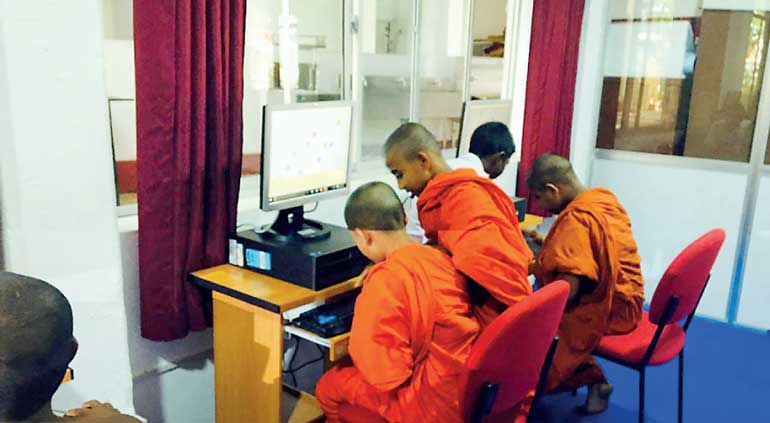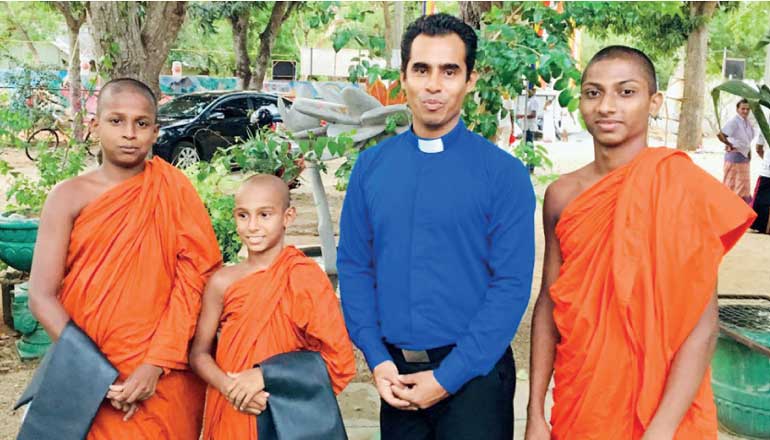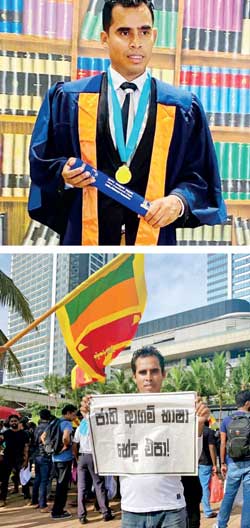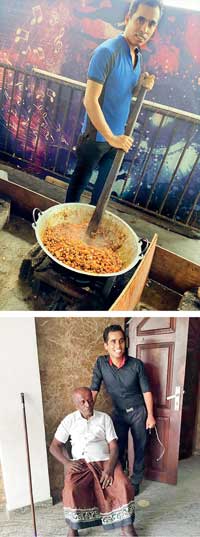Tuesday Feb 17, 2026
Tuesday Feb 17, 2026
Saturday, 5 November 2022 00:00 - - {{hitsCtrl.values.hits}}


 By Surya Vishwa
By Surya Vishwa
Most of us would take pride in our surnames or take pride in being offspring of such and such a lineage or family etc. However, the pettiness of all this false belonging explained well in the Buddhist doctrine of reality, would strike you once you speak to Moses Akash. At 38 years he is probably the youngest Sri Lankan to be conferred with the Deshamanya award, the second-highest national honour awarded by the Government of Sri Lanka as a civil honour.
Moses Akash does not know who his parents are and is thus spared the petty attachment to a surname. He uses at times the full name of Moses Akash de Silva, as a tribute to the pastor who cared for him after the age of 18, the age one has to leave the orphanage that one grows up in.
“It is the rule that one must leave the orphanage when turning eighteen. I left too, but without knowing where to go. I lived for three days at a bus stop in Kandy before I met Dishan de Silva who was into humanistic work as a Christian pastor,” says Moses.
Being without shelter and without food was something he had braved and he had taken it upon himself to make life different for others who undergo the same predicament.
The Deshamanya award that he received by the Government was for the provision of cooked food to anyone who needs a meal, feeding to date over 2,000 people a day in around fourteen locations in the country. By 11 September the Voice Foundation had commemorated providing over one lakh of cooked meals in their Community Kitchens Island wide.
Breaking the concept that it is only the ‘poor’ who may need a meal, Moses says that the Community Kitchens sometimes have well-dressed office workers who come for an occasional noon meal.
“I have known what it was like to be seemingly well clothed and be hungry without adequate money to pay for a meal. With the economic context worsening in Sri Lanka my task is not to be judgmental about who wants a meal and why. My task is to provide meals to anyone who needs it. Hence, anyone who enters our community kitchens spread across Colombo and outstations are offered a plate of hot cooked food,” he explains, adding that at times some office workers who share a meal at the community kitchen return as donors.
Among the areas the community kitchens are located in are; Rajagiriya, Grandpass, Little Heaven Sunday School in Colombo, Voice Safe House in Colombo, Malabe Subothi primary school, Obesekarapura, Maskeliya, Chilaw, Poonagala, Jaffna and Kilinochchi. Schools are the main locations the community kitchens operate from.
So far many of Sri Lanka’s top companies and banks support the Voice Foundation through which Moses and his team works.
 “I started the charity Voice for the Voiceless Foundation with a few friends around a decade ago and we function in areas of education, provision of food, care of the elderly, care of widows and orphans,” Moses states.
“I started the charity Voice for the Voiceless Foundation with a few friends around a decade ago and we function in areas of education, provision of food, care of the elderly, care of widows and orphans,” Moses states.
Working with a multi-ethnic and multi-religious mindset, he keeps aside his identity as a Christian pastor when carrying out his charity work.
“We work with Buddhist monks in temples in areas such as Kataragama, Matale, Dambulla and Katugastota where we have set up computer centres. I work with monks, giving them the due respect in my interactions and it is after a considerable time of working together that they realise I am a Christian pastor,” he says.
Asked about the common allegations that conversions are done through charity work by some Christian sects he answers that this is a myth where his work is concerned.
“Religion does not come into play in our work. All our work is done through the Voice Foundation which is a registered entity carrying out work with the needy devoid of any religious bias or motivation. My personal faith is kept away from my work. We have not had a single accusation or incident to date,” Moses states.
“Our intention is only to create a better Sri Lanka for all Sri Lankans and for this we have the support of Buddhist monks and those of other religions while our volunteer team is multi-ethnic and multi-religious.”
Does he benefit from the monies received as charity?
He answers that he does not take any salary for the work done through the Voice foundation and has established a separate business for himself which involves the selling of rural vegetation and fruits.
“The vehicles that we rent for our work often come back empty from village areas and for some time I have been purchasing and selling fruits and vegetables keeping a profit margin for myself. This functions as a separate business that I operate.”
Having received highest marks for his Ordinary Levels in his school in Kandy, he had nevertheless dropped out of the school he had enrolled for the Advanced Level.
“I wanted to be a doctor. I wanted to heal people. But in a way I am healing people now,” points out Moses. Three weeks back he was honoured with an honorary doctorate by the American National Business University in the United States, in recognition for his humanitarian work in Sri Lanka.
Why did he drop out of school?
“Throughout my life as a student I was bullied because I came from an orphanage. All orphans get bullied. We were called ‘madamme lamai (children from the orphanage)’ by other students. It is this that made me drop out even after I obtained the best results from my school for the O/L’s,’ he recalls.
It is this bullying that made him start lobbying for the marital status of parents to be removed from the birth certificate of children.
“We have done considerable lobbying for this and we are continuing this mission. It is a ridiculous thing to have a child to suffer social ostracisation because his parents were not married,” he notes.
He believes that there are many things that should change in how orphanages are run. For example, how orphanages constantly change schools of those in their care and most significantly the rule that all those who reach the age 18 should leave the orphanage.
“It is correct that a child who has reached the age of 18 could be categorised as an adult and should fend for himself in the world. But an eighteen-year-old grown up in an orphanage has not known life as a normal child living in a family, has no relatives or other support system and is financially zero.
“Expecting a child to leave in these circumstances is horrific. Having lived through that phase, I have been for twenty years working with those leaving orphanages, attempting to provide them with shelter and assistance to start their life in the world on their own,” he explains, adding that he currently houses three such young persons and works for the wellbeing of hundreds of other ‘care leavers’ through diverse programs and projects.
“We work with women, and elders as well, where we have initiated women’s empowerment centres and elders’ homes. We work with widows and abandoned women. The elders’ homes we have started are home to old people who had no place to stay and were on the streets. We do these things because our motto is envisaging a better Sri Lanka with better Sri Lankans,” he emphasises.
Among the first persons to support his charity work were Michael Moonesinghe and Kushil Gunasekera.
What he started at the outset, about 11 years ago - the supplying of dry rations to the needy and working with the affected during climatic disasters such as drought and flood, is still continued.
“We supply dry rations to over 35,000 needy families yearly and across Sri Lanka, including the North of the country,” he says.
Working for peace and stability in the country is also part of the Voice mission, he points out and adds that they work neutrally with any Sri Lankan State Institution or Government if the requirement arises.
The Voice foundation last month had the staff of the President’s office providing the dry rations and assisting in the cooking in the community kitchens.
Given that they have many volunteers from diverse social backgrounds, including staff of banks and multinational companies volunteering at cooking the meals and providing the vegetables and other items, it seems perfectly normal in Moses’s view to have staff of the President’s office to come and volunteer in the cooking. “We are facing challenging times as a nation and I believe that we can overcome this crisis if we each take our individual suffering and try to look beyond ourselves in finding solutions,” he states.